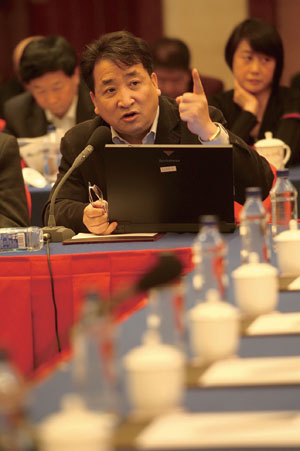

At the annual Two Sessions (the National People’s Congress (NPC) and the Chinese People’s Political Consultative Conference (CPPCC)), piracy and copyright protection have been the most-talked topic in the copyright field among NPC deputies and CPPCC members, and it was no exception this year. Particularly at the CPPCC sessions, infringement and protection have been a focus of heated discussions among members from literary and artistic circles. This is easily understandable, because they are the group most hurt by infringement.
Getting it off the chest
Much has been discussed about the harm of infringement and piracy, and the importance of copyright protection appears to be self-evident. However, the harsh realities have prodded the members to speak out.
Wu Weishan, a member of CPPCC National Committee and President of Chinese Academy of Sculpture, said, “Infringement has seriously hurt academic dignity and the personal dignity of creators.”
Xu Qinsong, a member of CPPCC National Committee and President of Guangdong Painting Academy, said, “The situation is even worse in artistic circle. Currently there are too many instances of infringement and fake paintings are everywhere. Fake paintings have been going rampant in either auctions or the markets.”
Wang Liping, a member of CPPCC National Committee and President of the Music Copyright Society of China, believed that protection of intellectual property should be strengthened in the development of cultural industries. Thanks to the efforts by Wang Liping and his colleagues, currently people have been making contact with the society voluntarily to broadcast musical works. He said, “It is a good sign, but far from enough. Musical works, films, literature, photography, etc., are all products of the sweat and wisdom of creators. Strengthening intellectual property protection not only encourages emergence of outstanding works, but also promotes better development of cultural industries.”
On January 1 this year, the long-awaited Interim Measures for the Payment of Remunerations for the Broadcast of Sound Recordings by Radio and Television Stations finally went into effect, which was an important step in the State’s protection of copyright and safeguard of legitimate rights and interests of writers and artists.
“The remuneration obtained in accordance with the measures is a source of income for musicians within the system and even an important source of income for musicians beyond the system. For them, survival is of primary importance, and then comes the talk about dignity. Let the artists have nothing to worry about in the future, then encourage them to create more good works,” said Wang Liping.
The laws and regulations on rights protection have come out, but there is much work to do to effectively implement them. For various reasons, many Quyi artists, musicians and off-stage artists have not yet benefited from the measures.
In this regard, Jiang Kun, a member of CPPCC National Committee and Party Secretary of Chinese Ballad Singers Association, pointed out that the Copyright Law clearly provides that literary and artistic works, including ballad songs, are protected by the Copyright Law, but no detailed provisions are available which clearly state the obligations of users of works, amount of remuneration, contract liabilities and infringement penalties.
Ye Xiaogang, a member of CPPCC Standing Committee and Vice Chairman of Chinese Musicians Association, said: “I know this provision, but I am not sure about how to pay and how much to pay. Musical works broadcast on radio and television stations should obtain copyright protection. I have received such money from abroad, sometimes more than one hundred thousand, sometimes about two or three hundred thousand. However, I have not received such money at home.”
Gong Hanlin, a member of CPPCC National Committee and top-grade actor with the China Broadcasting Performing Arts Troupe, said: “I have never received such money. Having cooperated with the media for so long, we do not really want to embarrass either side on this issue. But I personally think the country should be more proactive. At present, our county’s major media are all state-owned without exception. Individuals are dwarfed in the face of the state, and who are we to wrestle a Goliath.”
Some members even pointed out that it is absolutely impossible for anyone to get remuneration for the usage of broadcasting rights from radio, film and television organizations due to a lack of relevant provisions in China’s copyright laws and regulations. As a matter of fact, this is just a “lip service” for copyright owners, which will never be materialized, thereby having given rise to social injustice. Facts have proved that the lack of such a system has seriously affected creative initiatives of the majority of copyright holders and damaged the public image of China’s radio, film and television organizations.
Wide concern about Internet copyright protection
Internet piracy was one of focuses of the two sessions. A review of the status of online copyright protections in recent years brings back many unpleasant memories: chaos in Internet music downloads, numerous lawsuits involving online literary works and increasing disputes across the online video industry. The issue of Internet piracy not only has a tremendous impact on genuine film and television works, but also is an important factor leading to the decline of the traditional audio-visual industry. Furthermore, it has posed as a realistic obstacle in affecting the healthy development of arts and culture.
Zhang Kangkang, a member of CPPCC National Committee, is the Vice-Chairman of the China Writers Association and a State counselor as well. Three of her five proposals submitted this year were related to copyright protection. Among them, Proposal on Strengthening Internet Copyright Protection was particularly noticeable.
In the proposal, Zhang Kangkang pointed out the grim situation faced by the current Internet copyright system. In recent years, the rapid development of the information industry and rampant online piracy has grown simultaneously. Internet copyright protection has become an urgent new problem. According to statistics, the rate of online video piracy neared 70%; and annually tens of billions of Yuan were lost due to piracy of digital music. More than 100 billion Yuan in economic value based on market prices was lost annually due to software piracy and pirate websites have caused losses of 4 to 6 billion Yuan annually to the Internet literature.
In the proposal, Zhang Kangkang also particularly mentioned the copyright status of the Internet literature she was most concerned about. At present, China has tens of thousands of large-scale pirate websites of literary works and about one million small and medium-sized pirate websites; Internet stories, which are ranked top 10 in hits, have been illegally distributed more than 10 million times on the Internet. The ratio of genuine contents to pirated contents distributed on the Internet reached 1:50, in other words, if one Yuan is earned from genuine operation, 50 Yuan will be lost due to piracy.
CPPCC National Committee member Feng Jicai also expressed great frustration over online infringement, saying: “the Internet has completely deprived me of any rights. And you can find my stories online at will. The Google digital library has 208 works of mine, but I really find no way out. Network infringement has made writers commercial resources, while the absence of network supervision will do great harm to the creativity of writers and hurt a nation’s originality in the long term.”
Appeal to improve collective management of copyright
Collective management of copyright has now entered a phase of expansion after a period of exploring practices. Though it is unsatisfactory in many aspects, it represents a trend towards copyright administration.
Speaking of payment issue of broadcasting musical works in radio and television stations, CPPCC National Committee member Ye Xiaogang said: “I still hope that collective copyright administration organizations can take over to manage the rights.” Gong Hanlin also said: “Payment involving copyright should be handled by collective administration organizations, which are more powerful than individuals.”
As a member of China Written Works Copyright Society (hereinafter referred to as the CWWCS), Zhang Kangkang has shown considerable concern about the development of collective copyright administration organizations. According to Zhang Hongbo, Deputy Director of the CWWCS, they submitted, through Zhang Kangkang, the Proposal on Strengthening Construction of Collective Copyright Administration Organizations to the sessions. The proposal suggests adding one paragraph to Article 47 of the Regulations on the Collective Administration of Copyright. The paragraph expressly grants collective administration organizations “statutory licensing” power to receive royalty payments, clearly define qualifications of collective copyright administration organizations as litigation subjects and expand their rights of action in an appropriate manner. In addition, the added paragraph guarantees that collective administration organizations, in collection of “statutory license” copyright royalties, may file a lawsuit in their own name in court or take other legal measures.
In addition, according to Zhang Hongbo, they have submitted, through Song Yushui, a NPC deputy and vice-President of Beijing Haidian District People’s Court, a Proposal on Improving Copyright Legislation, Speeding up Construction and Development of Collective Copyright Administration Organizations. Song Yushui proposed many revisions to the Copyright Law with respect to the issue of collective copyright administration.
(Translated by Wang Hongjun)
|
Copyright © 2003-2018 China Intellectual Property Magazine,All rights Reserved . www.chinaipmagazine.com 京ICP备09051062号 |
|
|



